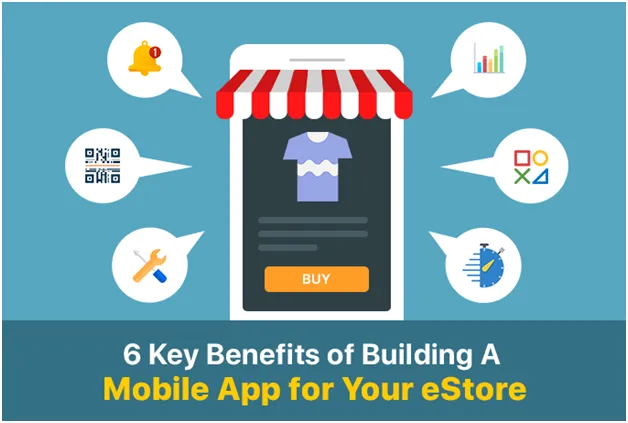

6 Key Benefits of Building A Mobile App for Your EStore

With the emergence of mobile apps, many commercial, social media and e-commerce websites have benefitted. One has to thank an unprecedented extensive use of smartphones for that. App stores have provided a platform to showcase different apps. Related searches and suggestions have also eased promotions. With enough data for users and downloads made easy, users have an effective source to download and a simple setup to install the apps.
However, what is it about mobile apps that appeal to everyone so much?
Is it optimized content on a small screen? Or is it the fast loading pages? Or is it a blend of these little but significant improvements enhancing the user experience?
That will be figured in sometime.
Users are active on social media for hours during a day. eCommerce mobile apps are also taking advantage of this connectivity, and it has never been easier to make a user aware of special alerts.
eCommerce businesses have profited from these features to a great extent.
But is it necessary to have an app for your eCommerce business?
Discussing a few advantages of mobile apps over a regular website should reveal if a mobile app has become a necessity or not. An in-depth discussion should also answer how an eCommerce development company can assist in developing such an app.
1). It’s All About a Push:
A regular website can highlight a new message only when the user is on that page. Some websites have tabs showing a new message or even a pop-up showing over the computer screen. Multiple tabs open at a single time make it difficult to catch, and pop-ups vanish soon enough, this is also what is lacking in a mobile phone internet browser. Push notifications, however, show an email or a new alert sitting right there in the notifications center of the mobile phone. With the right eCommerce developer, a brand can have a customized look and feel of the notification along with the proper musical chime to make a user connect with the app. It will not only bring attention to the app but also create an urge to see what’s new.
2). Curious Case of a QR:
Billboards and posters are part of marketing campaigns. But sometimes a user does not have enough time to note down or remember a critical piece of information. Also, not everyone gets the gist from a single image. Not a concern anymore with the advent of QR code. A small matrix barcode which is easily scanned with a mobile device can take the user to a video advertisement, a catalog of images or to a landing page of the product in the mobile app. Setting up a QR code is easy. But it is essential that a mobile app incorporates a scanning feature and responds well to the QR code. If this is absent, a business can miss out on an opportunity that others are making the most of.
3). Because It’s Personal:
Tweaking a page on a mobile app is not only less burdensome, but also less risky than modifying an entire webpage. Mobile apps also provide an opportunity to revamp the branding of an eCommerce business. Along with thoughtful options such as language settings, geographical location, and behavioral patterns learned through big data, a user receives a personalized experience which solidifies the connection between the brand and the user. With users wanting to relate to a brand, it is of principal importance that the brand also reflects the admiration received. A development team well versed in changing market patterns and not only observing but creating trends helps you stay ahead in the game.
4). The Math Is Right:
Numbers do not lie. Here are a few:
A study on eCommerce marketing strategies reveals that with 67.26% of participants approving, social media marketing is the 3rd most favored digital marketing strategy.
A majority of users spend the bulk of their time on mobile apps rather than mobile websites.
96.55% of social media audience open their social accounts at least 4 times a day and spend a lot of time in scrolling various posts.
This correlation is not apparent to the naked eye but has steadily and gradually developed between eCommerce mobile apps and social media marketing.
With so much time spent by mobile phone users on social media accounts, and so much invested in social media marketing, users are bound to bounce onto mobile apps through clickable advertisements and links.
5). A Gentle Reminder:
A mobile app might be in constant use, but with a substantial amount spent by users being online or on the device itself helps. The app icon sitting on a home screen is a constant reminder of the brand and creates an impulse to revisit the app. It is also a subliminal advertisement every time the user sees the mobile app icon. With captivating graphics, a developer can help the brand always sit comfortably in the corner of the customer’s eye.
6). It’s a Race Against the Clock:
The crux is speed. Mobile websites, though optimized, still load slowly as compared to pages on a mobile app — apps stores data and individual preferences locally as opposed to websites which communicate with servers. The framework of a mobile device along with the scripts used to facilitate the smoother and faster functioning of a mobile app.
All these elements are diverse but work silently in conjunction resulting in the seamless working of a mobile app. However, all this is not achievable until an eCommerce business has partnered with the right app development company who has the vision and resources to cope with changing trends and a sound understanding of the technology of today that drives a dream through a little app all but hibernating in a smartphone.






